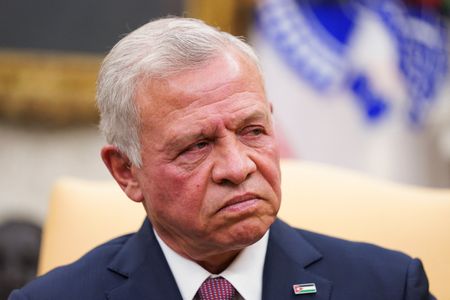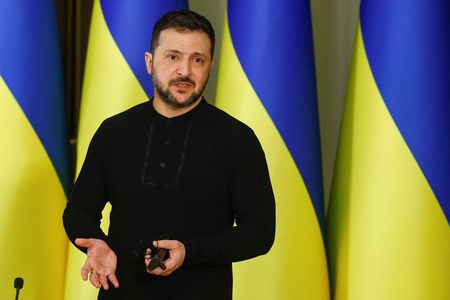By James Mackenzie, Jana Choukeir and Maha El Dahan
JERUSALEM/DUBAI (Reuters) – Israel has called up military reservists to brace for a possible re-eruption of war in Gaza if Hamas fails to meet a Saturday deadline to free further Israeli hostages and a nearly month-old ceasefire unravels.
Concern that the truce will collapse is growing as fury mounts in the Arab world over President Donald Trump’s plan for the United States to take over Gaza, resettle its Palestinian inhabitants and build an international beach resort.
Hamas said Egypt and Qatar, which with U.S. support mediated the ceasefire deal that took effect on January 19, had stepped up efforts to break the impasse and the Palestinian militant group’s Gaza chief, Khalil Al-Hayya, arrived in Cairo for talks.
Hamas agreed under the deal to free three more hostages on Saturday but said this week that it was suspending the handover over what it said were Israeli violations of the terms.
Trump responded by saying all hostages must be freed by noon on Saturday or he would “let hell break out”.
Israeli Defence Minister Israel Katz said the truce was meant to bring about a swift release of hostages held in harsh conditions in Gaza. “If Hamas stops the hostage releases then there is no ceasefire and there is war,” he said in remarks at Israeli defence headquarters in Tel Aviv.
Katz added that “the new Gaza war” will be of another intensity altogether and “allow the realisation of Trump’s vision for Gaza”.
“Hamas … will not accept the language of American and Israeli threats,” Hamas spokesperson Hazaem Qassem said in a statement. “Contacts are underway with mediator countries to conclude the implementation of the ceasefire deal.”
Israeli Prime Minister Benjamin Netanyahu said on Tuesday Israel would resume “intense fighting” if Hamas did not meet the deadline, but did not say how many hostages should be freed.
Netanyahu said he had ordered the military to gather forces in and around Gaza, and the military announced it was deploying additional forces to Israel’s south, near Gaza, including mobilising reservists.
Trump, in a White House meeting with Jordan’s King Abdullah on Tuesday, asked him to ensure Hamas understood the “severity of the situation” if hostages were not freed by Saturday, the White House said on Wednesday.
SHATTERING WAR
The standoff threatens to reignite a conflict that has devastated the Gaza Strip, internally displaced most of its people, caused shortages of food and running water, and driven the Middle East to the brink of a wider regional war.
Gazans expressed alarm that the ceasefire might collapse and urged Hamas and Israeli leaders to agree on an extension.
“We had barely started believing that a truce would happen and that a solution was on the way, God willing,” said Lotfy Abu Taha, a resident of Rafah in southern Gaza. “The people are suffering. The people are the victims.”
The armed wing of Hamas ally Islamic Jihad, which is also holding Israeli hostages, warned that their fate was tied to Netanyahu’s actions.
“The only way to retrieve hostages and for stability to come back is through a (hostage-prisoner) swap deal,” its spokesperson said on Telegram.
In a further sign of Arab anger over Trump’s vision of Gaza, two Egyptian security sources said President Abdel Fattah al-Sisi would not go to Washington for talks if the agenda included Trump’s plan to displace Palestinians.
The date for such a visit has not been announced, and the Egyptian presidency and foreign ministry did not comment.
SOME HOSTAGES ALREADY FREED
The Gaza war was triggered by the lightning Hamas-led attack on southern Israel on October 7, 2023, in which at least 1,200 people were killed and more than 250 were taken as hostages into Gaza, according to Israeli tallies.
In response, Israel began an air and ground war against Hamas which has killed more than 48,000 Palestinians in small, densely populated Gaza, according to Gaza health officials.
Hamas has freed 16 Israeli hostages from an initial group of 33 children, women and older men to be exchanged for hundreds of Palestinian prisoners and detainees in the first stage of the ceasefire deal. It also returned five Thai hostages.
Negotiators hope a second phase of ceasefire talks will secure agreement on releasing the remaining hostages and a full Israeli troop withdrawal from Gaza.
Palestinians fear a repeat of the “Nakba”, or catastrophe, when nearly 800,000 people fled or were driven out of Palestine during the 1948 war that led to Israel’s creation. Israel denies the account that they were forced out. Trump has said they would have no right to return under his plan for Gaza.
(Additional reporting by Nidal al-Mughrabi in Cairo, Nayera Abdallah in Dubai and Doina Chiacu in Washington; writing by Michael Georgy, Timothy Heritage and Mark Heinrich; editing by Bernadette Baum and Hugh Lawson)















